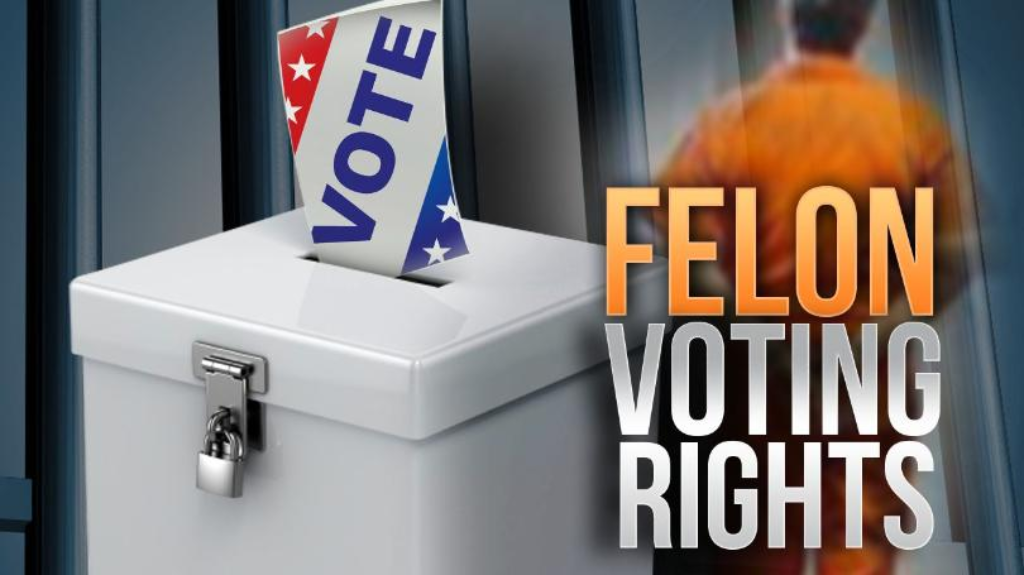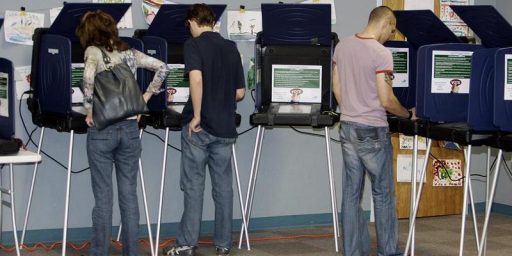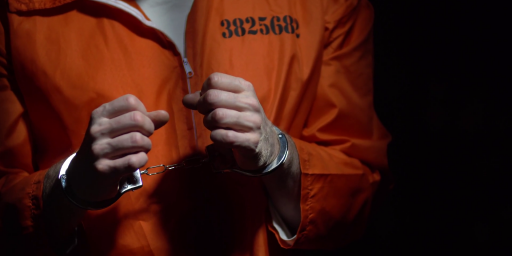Florida Voters Approve Restoration Of Felon Voting Rights
Florida voters approved an amendment to the state's Constitution that will restore the voting rights of as many as 1.2 million ex-felons and make it easier for future released felons to get their civil rights back.

Yesterday, Florida voters approved an amendment to the State’s Constitution that will lead to the restoration of voting rights to potentially millions of former felons who have served their time in prison and on parole but are still unable to vote:
About 1.2 million convicted felons in Florida will automatically have their right to vote restored, thanks to a ballot measure that received about 65 percent of the vote Tuesday.
At least 60 percent of voters had to approve it for Amendment 4 to become law.
For the past seven years, felons have had to wait five years after completing their sentence to even apply to have their voting rights restored.
The movement to reform the state’s notoriously strict restoration process was championed by the Florida Rights Restoration Coalition, a bipartisan group led by convicted felons. The group collected more than 800,000 signatures to qualify Amendment 4 for the 2018 ballot.
“Right about now, we can presently say that we have made history,” said Rhonda Thomas, manager of the “Let My People Vote” campaign. “We are just ready to go forth and see greater things take place in the state of Florida.”
Approval of the amendment ends Florida’s outlier status as the state with the most people permanently barred from voting — only two other states ban felons from the polls for life.
Amendment 4 restores the right to vote to convicted felons who have completed all terms of their sentences, including probation and restitution, but excludes those who are convicted of murder or sex crimes. Those people will still be barred from voting unless their rights are restored by the state clemency board, which consists of the governor and the three cabinet officers (attorney general, chief financial officer and commissioner of agriculture and consumer services).
While the campaign had wide bipartisan support and little-organized opposition, some candidates stated they did not support the measure.
Republicans like gubernatorial candidate Ron DeSantis and Gov. Rick Scott, nominee for U.S. Senate, said they were opposed.
Scott has said, “If you are a convicted felon part of what you did is you lose your rights and there ought to be a process to get those rights back. I think it is fair to the rest of the citizens of the state.”
Both Democratic opponents, incumbent Democratic Sen. Bill Nelson and Tallahassee Mayor Andrew Gillum, supported Amendment 4.
Throughout the campaign, the ballot measure gained star-studded support from the likes of “Orange Is The New Black” author Piper Chapman, John Legend, Ben & Jerry’s Ice Cream, NFL stars like Warrick Dunn and even the Koch-backed Freedom Partners.
Strong financial support came from donors like the American Civil Liberties Union, which paid for more than $5 million in advertising on TV and social media, in both English and Spanish.
In addition to the ACLU the measure was also supported by several groups on the right, including a group supported by the conservative Koch Brothers, who have spent a considerable amount of money in recent years backing a variety of criminal justice reform measures such as sentencing reform, civil asset forfeiture reform, and other issues dealing with the civil rights of accused and convicted criminals. This is another example of the extent to which some groups on the right, as well as politicians, have worked across the aisle on these issues, although the extent to which they have been successful has been limited due to the fact that these issues still face opposition from some conservatives as well as so-called “law and order” supporters.
The restoration of voting rights to people who have served their sentence and completed any necessary probation has become an increasingly central part of the overall criminal justice reform movement that has created some unlikely political alliances on the national and state level. Kentucky Senator Rand Paul, for example, was talking about the issue as long ago as four years ago and at one point was the co-sponsor of a bill that would restore voting rights to a large category of such people nationwide, although it would only apply to Federal elections since Congress cannot dictate how states handle their own election process. At the state level, the effort to simplify the process that ex-felons must go through to get their rights restored has been underway for some time now, but seems to have picked up steam in recent years. Other states have been gradually been changing their laws to provide that voting and other civil rights are automatically restored upon completion of a sentence, including any conditions of probation or parole. Indeed, until the passage of this referendum, there were only three states left in the country where someone convicted of a felony is permanently denied their right to vote, Florida, Iowa, and Kentucky. Given the trends on this issue, it likely won’t be long before those states reform their laws as well.
As a policy matter, this seems to me to be an easy issue. Once someone has completed the terms of their sentence, there is no valid reason to continue denying them their civil rights, including the right to vote, either until they are able to navigate a restoration petition through a bureaucratic maze or for the rest of their lives. Whether the ex-felons choose to exercise that right to vote or not is their choice, but to the extent it symbolizes the fact that the completion of their sentence should be seen as a second chance at a clean life, a step like this could just be what it takes to help many of these people avoid falling through the cracks again. In any case, hopefully, this move will provide impetus to similar efforts across the country, because it’s long overdue.






This is good news — we should want felons who have served their time to be as connected into their communities as possible, and we should want everyone to be able to vote.
The fact that individual states can play around with someone’s right to vote this way (and the other fun voter suppression rules), makes me think that we need national laws setting a standard.
That is rich coming from a man who oversaw the largest Medicare fraud in history. If ever there was an example of why chutzpah should be a capitol crime, Rick Scott is it.
Doug wrote:
100% to this. It’s an area where the Kochs and others have been doing really important work. Disclosure: I work for an organization that has received Koch funding related in the past.
But, generally speaking, this is a space where there is a lot of opportunity for collaboration. Which gets to:
Again 100% correct. The other current problem is the occupant of the White House. If this was any other Republican administration, I think we would be able to get legislation like the First Step Act passed with bi-partisan support helping overcome the entrenched resistance from folks like Tom Cotton. The Act made it through the House but stalled in the Senate.
Unfortunately, Trump has poisoned any possibility of that happening. And while he — or rather Jared Kushner — is generally interested in prison reform, he hasn’t been able to either (a) get the “tough on crime” Republicans onboard, or create an environment that would allow enough Senate Democrats* to feel able to vote.
* To be clear: this isn’t purely about not handing Trump a “win” — there’s some stuff in the Act around increased powers granted to the AG that a number of Senate Dems object to on civil liberties grounds.
Is there a particularly compelling reason to deny people the right to vote even while incarcerated? Many of these men (and we’re mostly taking about men) would probably benefit from taking a greater interest in politics.
@Kit:
Honestly, I’ve come around to the position of “no” on this.
There is an argument that their conviction is a sign that removing that right is part of a broader punishment (much like their freedom and other rights). I do get that.
The issue I have with it is how prisoners are often used to manipulate state politics. In many places, New York included, they are counted as “residents” of the prison versus their home addresses. It’s a way to help rural areas appear to have more population and maintain higher degrees of representation in state legislatures. I personally feel that if they are going to be used in that way, then they should have a say when it comes to local representation.
Well, our country has a history of counting people for population purposes who are denied rights that should go along with being counted….
I support this with some reservations. It can be used to encourage these people to straighten their lives. But one slip up, even a parking ticket, and they won’t be allowed to vote in an Assistant Dog Catcher primary.